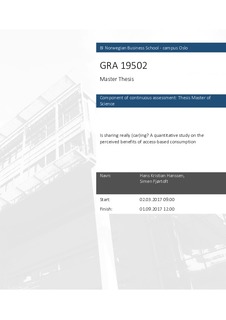Is sharing really (car)ing? A quantitative study on the perceived benefits of access-based consumption
Master thesis
Permanent lenke
http://hdl.handle.net/11250/2485960Utgivelsesdato
2017Metadata
Vis full innførselSamlinger
- Master of Science [1621]
Sammendrag
Changes in the perception of ownership are at the core of the sharing
economy, which size is now estimated to be $15 billion dollars. Consumers
have realized that buying access to products for limited time periods can
provide the same benefits as buying the product. Access-based consumption
deprives consumers of maintenances cost and other burdens economic of
ownership. Over 250 sharing economy services enable consumers to rent,
share, donate, lend, or purchase goods from fellow consumers or corporate
entities.
Previous studies on access-based consumption have focused on the
antecedents for participation in sharing and rental services. The purpose of
this thesis was to gain a greater understanding of consumer attitudes towards
access-based consumption. We wanted to investigate if the perceived
benefits from participation in sharing services, where consumers buy access
to goods from their peers, differ from those of rental services, which take
place in a business-to-consumer setting.
Using a quantitative between-subject design, we discovered large
differences in attitudes towards rental and sharing services. While
participation in sharing services is perceived to have economic,
environmental, and social benefits, participation in rental services is only
perceived to have social benefits. We also found differences in the
perceived social benefits of the two services. Sharing services were
perceived to create more social interaction and new friendships. In contrast,
the greatest social benefit of participation in rental services was a sense of
unity among the members. Additionally, our study found that sharing could
be regarded as an enjoyable experience, rather than just another as a form
of consumption
Beskrivelse
Masteroppgave(MSc) in Master of Science in Strategic Marketing Management - Handelshøyskolen BI, 2017
